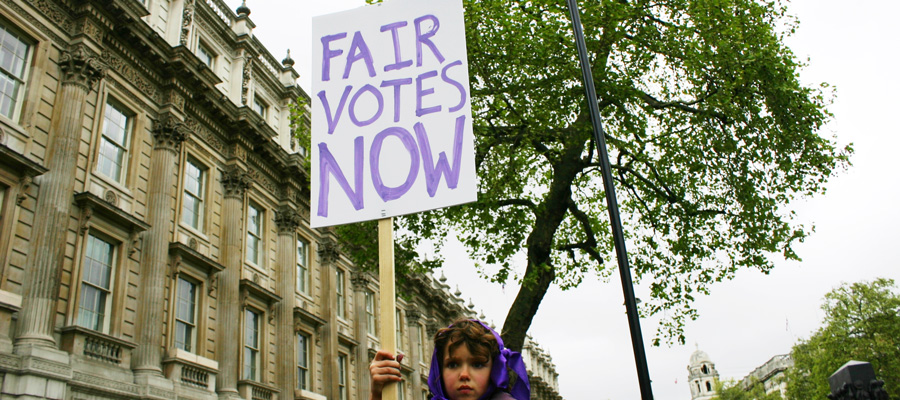Electoral reform will not enable the far right: Debunking a red herring

Debunking the claims of proportional representation naysayers
This is the second post of a series explaining the benefits of proportional representation and debunking myths from the ‘No’ side of BC’s 2018 electoral reform referendum. More from the series is available at policynote.ca/pr4bc.
It is now clear that a core assertion of the ‘No’ side in the electoral reform referendum—one that will be endlessly repeated over the coming months—is that proportional representation (pro rep) should be rejected because it will enable far right or “extremist” political parties.
It is a spurious claim.
The likelihood of seeing extreme, right-wing parties gain a new foothold in our province, should British Columbians choose to embrace pro rep next fall, is virtually zero.
Throughout the past century, democracies around the world have wrestled with the scourge of far right, fascist and xenophobic political parties, whose relative prominence tends to ebb and flow with political and economic events. But their political “success” has had nothing to do with the electoral system.
No electoral system has a monopoly on either preventing or fostering far right parties, and those advancing claims to the contrary are merely cherry-picking examples to make mischief in this referendum.
The record of first-past-the-post
Big picture, it is worth appreciating that our current first-past-the-post (FPTP) electoral system is actually the exception—not the norm—among democratic countries. Most democracies employ some form of pro rep. There are really only four democracies that still use exclusively FPTP: the USA, the UK, India and, of course, Canada. These four countries have also been more apt to elect hard right governments with false majorities that impose radical right-wing agendas:
- Most recently, the USA elected Donald Trump under a FPTP system. In that case, Trump won with less of the popular vote than his opponent Hilary Clinton received. The US Congress is also elected under FPTP, and the Republican Party (which currently commands majorities in both the Senate and House of Representatives) arguably has an immigration policy platform that is as, if not more, anti-immigrant than any European government.
- The UK elected Margaret Thatcher with a false majority (she first won 100% of the power with 44% of the popular vote), ushering in the first hardcore neoliberal government of the post-World War II era.
- India, under FPTP, most recently elected the Modi government with a false majority (100% of the power with 31% of the popular vote), whose Hindu nationalist Bharatiya Janata Party is seen as neofascist by many.
- And then there is Canada, with our antiquated FPTP system that has given false majorities to the likes of Stephen Harper, Gordon Campbell, Mike Harris and most recently Doug Ford, all of whom received 100% of the power to impose their austerity agendas.
(To this list we might also add the Philippines. Their presidential election uses FPTP, although their legislature does not. The current president, Rodrigo Duterte, is cut from much the same cloth as Trump. He is a populist demagogue whose human rights record and encouragement of extrajudicial killings of alleged criminals is a source of great international consternation. In 2016, Duterte won with just 39% of the vote, while two more progressive/centrist candidates received votes that outnumbered him in combination. And yet, Duterte rules—with a murderous iron fist.)
In some cases, conservative parties elected under FPTP have quietly accommodated ultra-right elements within their big tents, granting these far right tendencies considerable power within our existing system (witness Trump’s inclusion of alt-right elements within his Republican government, or the Harper government’s dog-whistle appeals to anti-immigrant tendencies).
No electoral system has a monopoly on either preventing or fostering far right parties. The contention that FPTP will somehow save us from far right political elements is rubbish.
Given this, a question worth considering is: What is better? Knowing what power these far right groups have because we can count their electoral seats and read the terms of a minority government policy program in black-and-white (as occurs under pro rep)? Or having these groups lurk in the shadows of big-tent conservative parties, without really knowing how much political clout they wield (as occurs now under FPTP)?
The point here is not to suggest that FPTP inherently produces more hard right governments. But rather, the contention that FPTP will somehow save us from far right political elements is rubbish.
What really encourages the emergence of far right parties?
The far more relevant point is this: Historically speaking, whenever we have seen the emergence of far right and neo-Nazi parties, it is clear they are a product not of the electoral system but of neoliberal policies and austerity.
This was most infamously true of Germany in the 1930s, where Hitler’s National Socialist (Nazi) party capitalized on the humiliations that came with punishing economic reparations and depression after World War I.1 In the 1980s, the UK saw an upswing in neo-Nazi movements under Thatcher’s cuts. And more recently, we’ve seen this in Greece, where the neo-Nazi Golden Dawn Party has made political gains (winning 7% of the vote in 2015) in the face of punishing austerity imposed by Greece’s debt holders.
Are there pro rep countries like Austria, Hungary and Poland where far right political parties have won disturbingly high seat counts? Yes, a few. But these countries don’t have an electoral system problem; they have a neo-Nazi problem, or have right-wing populist parties that would likely win regardless of the electoral system.
Some European countries are currently wrestling with a rise in anti-immigrant right-wing parties. But this is driven by the largest immigrant and refugee crisis since World War II (combined with austerity policies that leave people susceptible to scapegoating), not by the electoral system. And with a couple exceptions, their political systems are successfully keeping these despicable parties at bay. For example, in the Netherlands, Geert Wilders’ far-right Party of Freedom came in second in their most recent election, but all the other parties have joined forces to keep them sidelined.
Historically speaking, whenever we have seen the emergence of far right and neo-Nazi parties, it is clear they are a product not of the electoral system but of neoliberal policies and austerity.
The UK, under FPTP, has also seen the emergence of an ugly, extreme party—the UK Independence Party (or UKIP)—which “successfully” led the Brexit vote to leave the European Union (while capitalizing on anti-immigrant sentiments). Happily, the UKIP vote mostly collapsed in the last UK general election. But that wasn’t a testament to the FPTP system (after all, UKIP also gained a foothold under that same system), but rather, had more to do with the appeal of Jeremy Corbyn’s Labour campaign—a bold, progressive, populist campaign that displaced UKIP and won back those working-class voters.
Politics and platforms matter much more than electoral systems when it comes to scuttling the far right.2
Nothing to fear in BC
So where does all this leave us in BC, as we seek to decide what electoral system to embrace?
First, we really have nothing to fear. The choice before us will not determine if our politics are about to be taken over by far right or other extremist elements. Importantly, political culture isn’t rendered irrelevant by any voting system. If BC’s political culture has managed to avoid neo-Nazi and other radical fringe parties—which it thankfully has—then that’s not going to suddenly change if we choose to change our electoral system.
Second, we have the peace of mind of knowing that, with all three pro rep options that will be on the ballot this fall, the new system will require that a party receive at least 5% of the vote province-wide to be able to win a seat. This minimum threshold provides a safeguard against fringe parties getting into the Legislature.
And lastly—just in case you are still feeling a bit nervous—recall that Attorney General Dave Eby has included a fail-safe provision in the electoral reform process—an “escape clause,” if you will: if we choose to change our system, we get to road-test it for two elections. After that there will be another referendum. Meaning, we’ll get to try a pro rep alternative out in practice, and if a majority of us don’t like what we see, we get to vote to switch back to FPTP.
So this fall, don’t vote from a place of fear. Vote for what you want. And then liberate yourself to vote your conscience from then on.
Notes
- For more on the electoral context of Hitler’s rise to power, see: https://www.electoral-reform.org.uk/did-proportional-representation-put-the-nazis-in-power/
- Corbyn recently made this point in a speech to European Social Democrats: https://www.independent.co.uk/news/uk/politics/corbyn-european-social-democrats-reject-austerity-neoliberalism-warning-a8432511.html
Topics: Democracy



